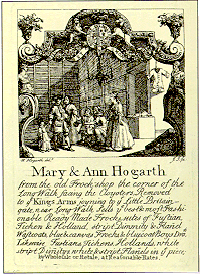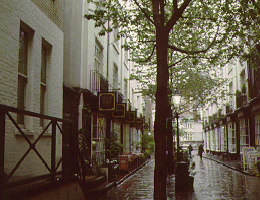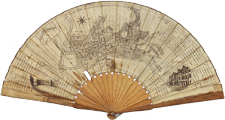Johnson on London in Society (1753)
The Adventurer n° LXVII, Tuesday, 26 June 1753:

- Hogarth’s tradecard for his sisters’ “frockshop” (1730)
- [click on the picture to enlarge it]
Those who have passed much of their lives in this great city, look upon its opulence and its multitudes, its extent and variety, with cold indifference; but an inhabitant of the remoter parts of the kingdom is immediately distinguished by a kind of dissipated curiosity, a busy endeavour to divide his attention amongst a thousand objects, and a wild confusion of astonishment and alarm.
The attention of a new-comer is generally first struck by the multiplicity of cries that stun him in the streets, and the variety of merchandise and manufactures which the shopkeepers expose on every hand and he is apt, by unwary bursts of admiration, to excite the merriment and contempt of those, who mistake the use of their eyes for effects of their understanding, and confound accidental knowledge with just reasoning.
But, surely, these are subjects on which any man may without reproach employ his meditations: the innumerable occupations, among which the thousands that swarm in the streets of London are distributed, may furnish employment to minds of every cast, and capacities of every degree. He that contemplates the extent of this wonderful city, finds it difficult to conceive, by what method plenty is maintained in our markets, and how the inhabitants are regularly supplied with the necessaries of life; but when he examines the shops and warehouses, sees the immense stores of every kind of merchandise piled up for sale, and runs over all the manufactures of art and products of nature which are everywhere attracting his eye and soliciting his purse, he will be inclined to conclude, that such quantities cannot easily be exhausted, and that part of mankind must soon stand still for want of employment, till the wares already provided shall be worn out and destroyed.

- Georgian shops in Woburn Walk
- (in the Northern part of the Bedford estates)
Photos MMM
[click on the picture to enlarge it]
As Socrates was passing through the fair at Athens, and casting his eyes over the shops and customers, ’how many things are here’, says he, ’that I do not want!’ The same sentiment is every moment rising in the mind of him that walks the streets of London, however inferior in philosophy to Socrates: he beholds a thousand shops crowded with goods, of which he can scarcely tell the use, and which, therefore, he is apt to consider as of no value: and, indeed, many of the arts by which families are supported, and wealth is heaped together, are of that minute and superfluous kind, which nothing but experience could evince possible to be prosecuted with advantage, and which, as the world might easily want, it could scarcely be expected to encourage.
But so it is, that custom, curiosity, or wantonness, supplies every art with patrons, and finds purchasers for every manufacture; the world is so adjusted, that not only bread, but riches may be obtained without great abilities, or arduous performances: the most unskilful hand and unenlightened mind have sufficient incitements to industry ; for he that is resolutely busy, can scarcely be in want. ...
Not only by these popular and modish trifles, but by a thousand unheeded and evanescent kinds of business, are the multitudes of this city preserved from idleness, and consequently from want....
When I look round upon those who are thus variously exerting their qualifications, I cannot but admire the secret concatenation of society...

